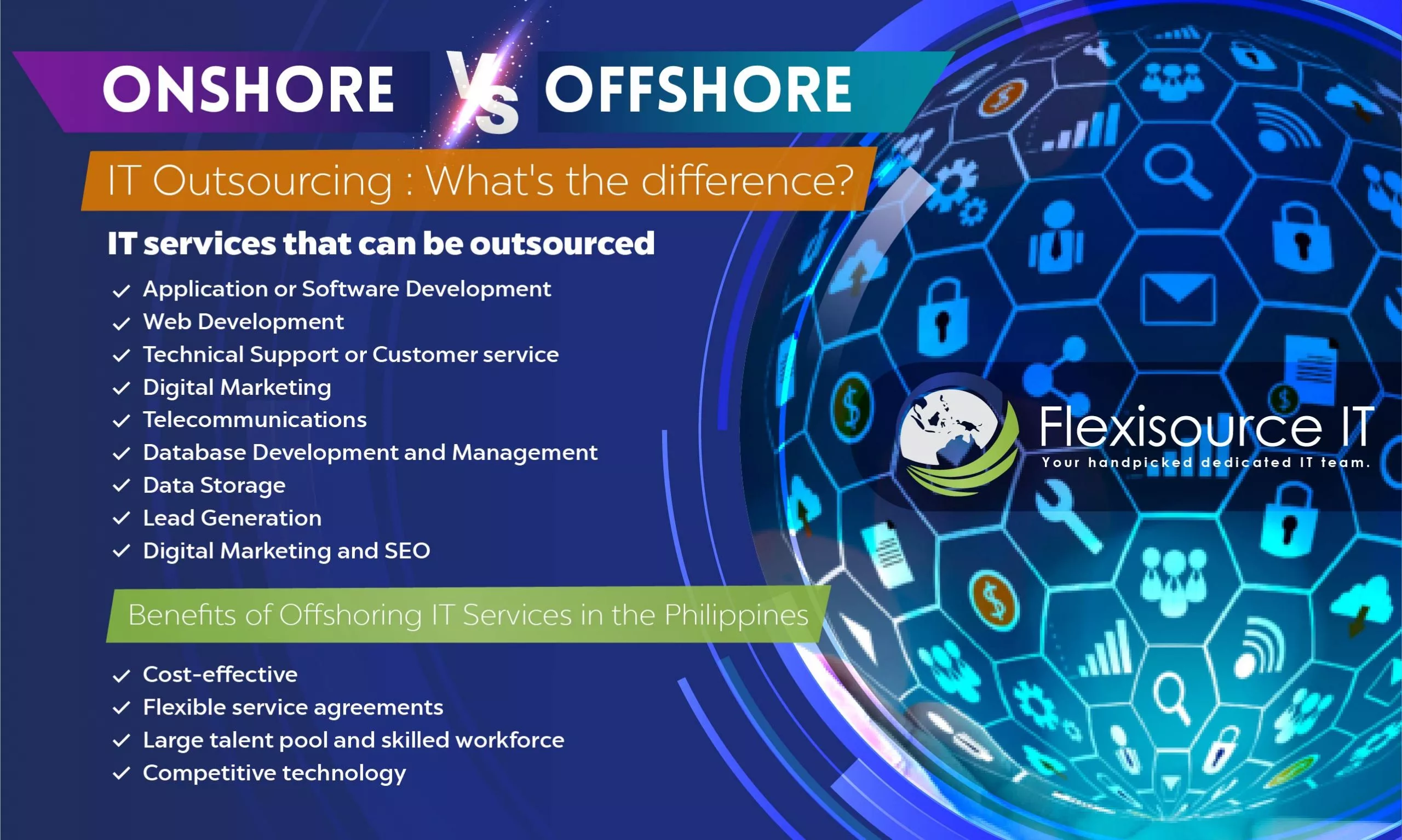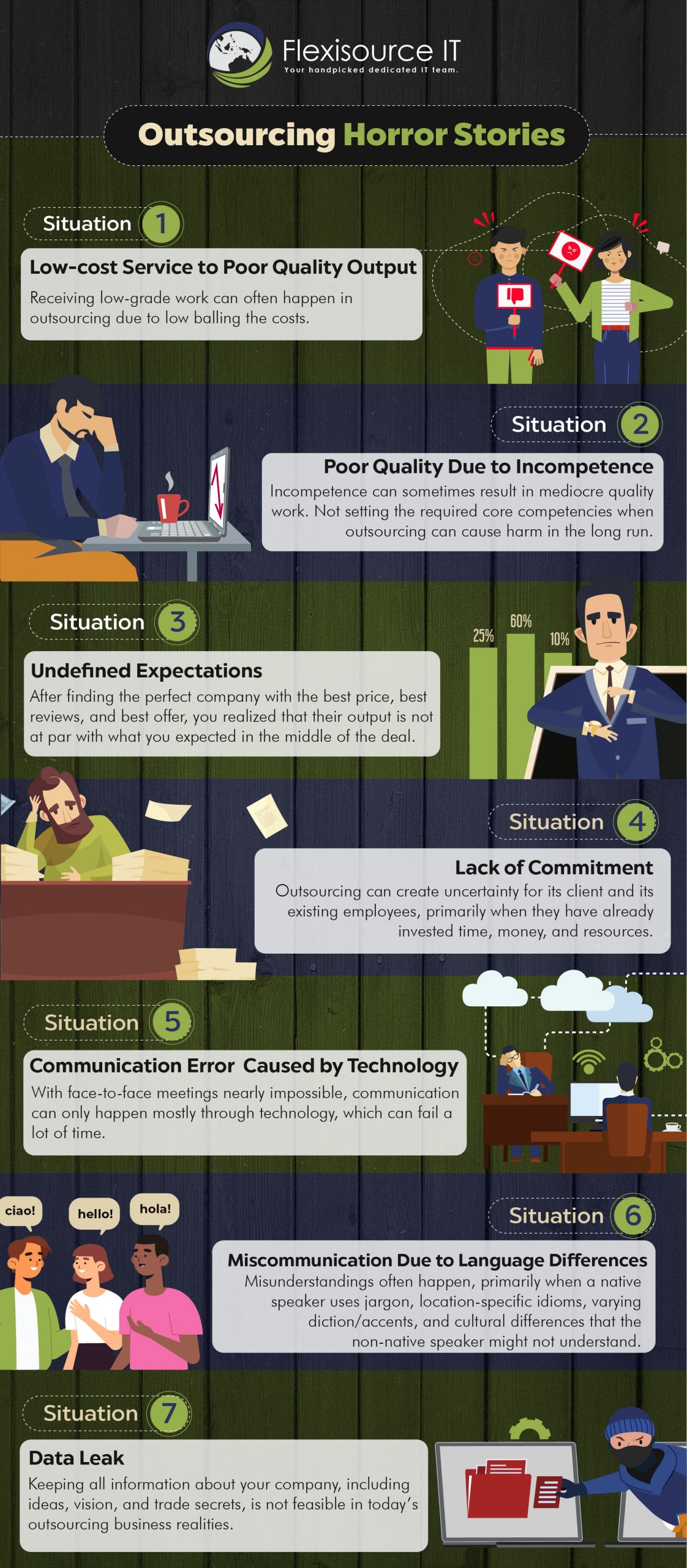Outsourcing has increasingly become a popular option for companies to fill the need of their businesses. Not only does it reduce the overhead costs, but it also increases the profit margins. Therefore, outsourcing became one of the most effective business model operations across the globe.
To put it simply, outsourcing is when a company relocates part of its business process to a third-party corporation or individual. Usually, companies outsource a section of their business when they need a specific set of unprocurable skills in their company to finish a project or produce a product.
What is the difference between onshore vs. offshore IT services outsourcing?

Outsourcing services are both available onshore and offshore. Onshore outsourcing refers to service providers located in the same country as your office headquarters. In contrast, offshore outsourcing is contracting a company located outside your country with considerable time zone differences. Some popular offshoring destinations are India, China, Hungary, Vietnam, and the Philippines.
What is Onshore Outsourcing?
Onshore outsourcing, also known as local outsourcing, is hiring a third-party company within your company’s country to handle nonessential activities but still holds a significant value to the business, such as human resources (HR), facility maintenance, and customer service. Unlike offshore, onshore enables better control between the companies.
As such, the following are other advantages of choosing onshore outsourcing.
- Time Difference – Time differences would not be a problem for onshore outsourcing since the company and employees are located within your country. You wouldn’t need to worry about adjusting your work schedule, as most meetings or catch-ups would be during the daytime. In addition, you would not need to worry if your employees are reachable or not in times of emergency.
- No Cultural Differences – Cultural differences is another aspect that most company worries when outsourcing a service. In this case, cultural differences are at the least of your worry. You do not need to do extensive research and adjust to the new customs and culture to adapt to your new employees. In addition, the language barrier would not be a problem.
Though onshore outsourcing has undeniably beautiful advantages, most onshore companies also have some of their disadvantages that business owners should consider:
- Expensive Cost – Operating an onshore company can cost a lot. Unlike offshore businesses, onshore companies located in developed countries are well regulated and follow strict labor laws. Hiring an employee can be more expensive for an onshore company. Thus, the services offered might be costly to compensate their workers well. Relatively, the onshore company is compulsory by law to comply with the tax laws. In Australia,
What is Offshore Outsourcing?
Offshore outsourcing or offshoring is an industry practice of having a third-party company deliver its internal operation outside of the investor’s country. In offshoring, the investing company maintains the ownership of the project, but the offshore team usually maneuvers the campaign.
Some benefits of offshoring services may include:
- Affordable Cost – One of the best advantages of offshore resources is their cost-effectiveness. Offshore services in countries like the Philippines, Vietnam, and India costs lower but have the same high-quality product as developed countries. Offshoring can help cut operation costs since employees you will be hiring are located in another country and housed by the offshore company. Thus, your company can slash out the additional costs on administration, facility, utilities, and others.
- Access to a Global Pool of Talent – Hiring a team of experts at lower costs is easy with the right offshore company. The company will provide you a dedicated team to handle your project with a broad range of services.
- Reduced Risk From Asset Lawsuit – Having an offshore company in different countries will help risk asset search or lawsuit. The offshore company separates you from your business. Since the company is located in an overseas jurisdiction, the legal system and laws will differ from where your headquarters is located, preventing any targeted asset search or lawsuit. Details about the owner are kept out of reach from the public unless a criminal investigation is involved.
Though offshore services have unique advantages, they can also have their own drawbacks business:

- Cultural Differences – Since offshore companies are from another nation, cultural and social differences may cause issues in your company. There will be a need for your company to accommodate some cultural and social norms practiced by the third-party service provider. Certain countries like the Philippines have an entrenched spiritual belief and celebration, which may affect your work schedule.
- Language Barrier – Part of having different culture is the language barrier. Despite the English language being universal, not all nations use English as their lingua franca. Communication issues may arise, creating tension between the leading company and the offshore party. For example, North Americans tend to be straightforward when conducting business. On the other hand, Filipinos are more introverted and indirect, which can be viewed as incompetence by the North Americans.
- Offshore fees and regulations – Despite its affordable cost, offshore companies are subject to a fixed amount of payments annually. Remittances and asset distribution are some aspects you need to watch out for. Once your assets and income reach the resident country, they are all subject to taxes.
What are Offshore IT Services?
As the world started to rely on technology, high demand on software and application development became a trend to the global market. Similarly, offshore IT Services became a trend in the industry due to IT professionals’ shortage with the right skills in web design, network configuration, management security, technical support, and program development.
In the past, offshore services were mainly centered on goods and customer support. However, in 2017, IT services dominated the top offshored services worldwide, with software application development taking 64% of the most outsourced IT functions worldwide.
Why do Business Owners Turn to IT offshoring and professionals work?
Outsourcing IT services can be prevalent due to the shortage of available IT professionals in the industry and the sumptuousness of their service. These services are best outsourced to an offshore staff rather than hiring a full-time onsite employee to lower day-to-day costs. Outsourced IT services are best offshored in countries like the Philippines and India for their infrastructure and workforce. Aside from that, companies also turn to IT offshoring for the following reasons:
- Shortage of skills and available talents – There is an ongoing shortage of qualified professionals in the IT Industry. It’s challenging for small to medium-scale companies to afford skilled developers to develop their needed platform.
- Cost-Effectiveness – Programmers with excellent skills in .Net, JavaScript, Python, PHP, XML are in demand. However, the salary expectation is far higher than others that small businesses can hardly afford to hire these developers. That is why some companies offshore these services to countries like the Philippines, where most pools of experienced and skilled programmers are located. According to Indeed, the average rate for a developer in Australia is about $48.39. The offshore developer rates in Asia begin with $20 for an entry-level offshore developer and $35 for a senior offshore developer.
- Additional Business Ventures – Since developers offshored from other countries are far less expensive, generated cost savings give businesses additional capital to explore other opportunities. In addition, cutting the operational costs create more revenues and extra profits for the company.
- Competent quality and development – By offshoring projects, small-scale IT Companies can focus on larger objectives and core business activities such as developing, managing, and implementing their goals and policies. The external service provider will take care of the company’s small IT and software development tasks, such as bug fixings, program maintenance, customer service, optimizing the company’s resources, streamlining the business process, and frees the management of additional tasks.
- Saves Time and Quick Progress – Despite the available technology, time zone differences are often an issue to companies when outsourcing. Issues like communication and deadlines might be overlooked when offshoring. Companies opt to stick to onshore teams to have better control over outsourced teams. However, different time zones also have their benefits. Having an offshore development team overseas is a unique way of overlapping coverage. Two teams working 8-hours per day equates to 16 hours of work. Projects can be completed earlier if you are on a tight schedule. In addition, time zone difference can benefit companies needing a 24-hour offshore IT supports services, without worrying about additional cost.
What IT services can be outsourced?
Popular tech companies like IBM, Microsoft, Apple, and Samsung usually offshore parts of their operation to other countries. The most common offshore IT outsourcing services are:
- Application or Software Development
- Web Development
- Technical Support or Customer service
- Digital Marketing
- Telecommunications
- Database Development and Management
- Data Storage
- Lead Generation
- Digital Marketing and SEO
What are the benefits of offshoring IT Services in the Philippines?
The Philippines is one of the best IT outsourcing destinations in the world, especially in Southeast Asia. The country is known for having talents and experts in business process outsourcing (BPO), Research and Development, Digital Marketing, and IT and Software Development.
Many businesses hire offshore developers in the Philippines since IT services are much more expensive in Australia. The Philippines is an excellent choice for IT outsourcing for its advantages, compared to other countries. The Philippines offers a competitive price for high-quality outsourcing. Similarly, the Philippines is strategically located near Australia, having only a three-to-five-hour time difference. Which helps eliminate the hassle of different working hours for both countries.
Aside from that, Filipinos are known to communicate English very effectively. Outsourced Filipino staff can speak almost perfect English, with a neutral accent, easily understood by Australian Clients.
Where can I outsource IT services?
With your handpicked dedicated team, Flexisource IT offers a wide range of offshore IT solutions services in Australia, which helps businesses pinpoint and solve their needs.
At Flexisource IT, we provide flexible and reliable services in IT, Customer Support, and Marketing. Get in touch with FSTI today.





